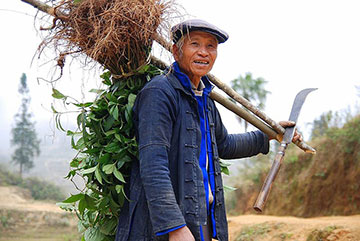A recent study backs up my belief in the value of good neighbors. It turns out, talking “over the fence” benefits the environment, too.
In southwestern China, the Grain-to-Green Program (GTGP) helps farmers in the Wolong Nature Reserve reduce soil erosion by paying them to convert sloping cropland to forest or grassland. Scientists from Michigan State University found that the farmers most likely to re-enroll their land in the conservation program after their initial sign-up, were those who got out and hashed it over with their neighbors. In fact, the more times they interacted, the more land was enrolled.

Farmer of the Hani minority near his village of Puduo, Yunnan, China. Photo courtesy of Wikimedia Commons, Takeaway
“The GTGP takes advantage of the general trend of rural-to-urban migration in China,” reported researcher Xiaodong Chen. “People want to work off-farm, but they don’t want to give up their land. Grain-to-Green allows them to do that and still get some income from the land. We found that if they talked to their neighbors, most people would actually leave the land in the program even if the payments stopped,” he said.
This is great news for the endangered giant panda and other species living in the Wolong reserve. Who would have guessed that neighborliness would play a key role in the panda’s survival?

Panda cub in the Wolong Nature Reserve. Photo by Sheila Lau. Courtesy of Wikimedia Commons.
Just goes to show that the power of positive action has no borders, knows no fences.




















































